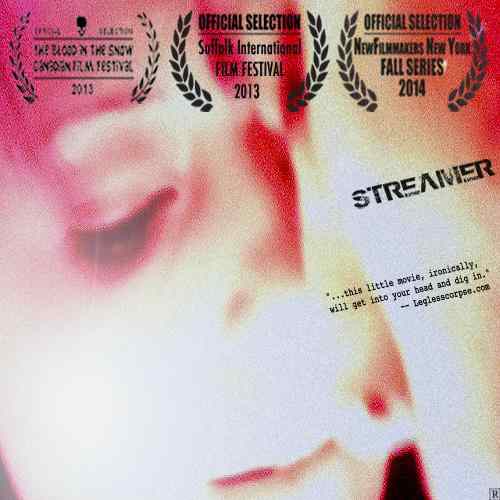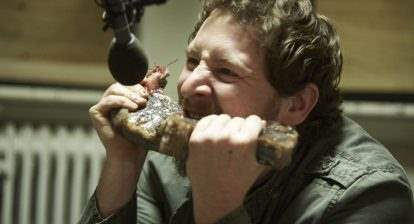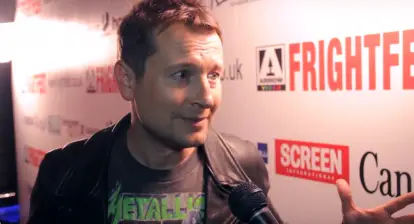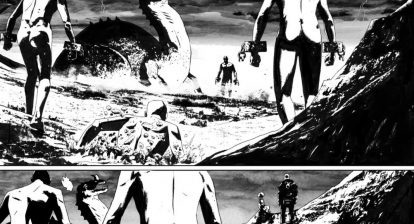Wicked Horror had the opportunity to chat with filmmaker Jared Bratt about his influences as a filmmaker, the challenges of working on a short versus a full length feature, and what’s next on the horizon for him. He opens up about his horror short Streamer and also fills us in on what we can expect from his upcoming feature film effort Sweetblood!
Wicked Horror: What are some of your cinematic influences as a director?
Jared Bratt: Early on, naturally growing up and responding to the films of Tarantino, Rodriguez, Linklater, Smith, these filmmakers and their films instilled this idea in me that just clicked when I was already starting to write my own scripts. This notion that no amount of budget restrictions could ever place any limitations on what one could do with the written word, specifically with dialogue. So the seed of loving long-winded diatribe starts there, and then as I started to make my own shorts with friends and whatnot, I organically fell into the editing process, and the works of Aronofsky, Boyle, Woo, Rodriguez, Lynch, Truffaut, they really start to impact me in the way that one can use editing to create a unique sense of style and pace, and communicate a voice through cutting creatively, and using editing to maneuver around certain larger ideas that, at first glance, seem less possible on a no-budget filmmaking scale. So, from writing dialogue that almost only works when strong actors are cast in the roles, and finding my ability to shape a narrative through cutting, all of this starts to inform the directing–how I direct, and the aesthetic that will come out of all of these elements working together.
I should also mention that Ethan Hawke’s directorial debut, his little-seen indie film Chelsea Walls (2001) was actually a major cinematic influence on [my short film] Streamer. I’ve been a fan of the flick since I saw it on DVD back when it came out. Specifically, there’s this one scene in a bathroom where the great and underrated Steve Zahn communicates to an escort he’s boozing with that his life has been nothing but a burnt-out bust of a wasted existence. The sequence is raw, tragic, and kinetic while also being contrastingly subtle , and utterly compelling. It’s a scene that I periodically find myself returning to, and while besides going through a personal experience that would truly lead to Streamer‘s genesis, this bit in Chelsea Walls reminded me that if something can really suck you into its world, who cares where it’s set, and for how long.
Wicked Horror: How did those influences play into Streamer?
Bratt: Streamer is a psychological-horror short, but as I present it to people–and I think this makes it kind of atypical, which I love–Streamer is a psychological-horror short that is dialogue-driven. I mean the core-body of it is really just two people in a room talking to each-other, and that breaks down into two strong actors, each with a monologue to preform. So the love of dialogue seeps into my undying love of genre film. Then my own self-taught knowledge of editing tells me how Streamer will feel, work, and come across as this surreal, energetically taught piece, even if said piece does indeed solely take place inside a bathroom (a setting that initially sounds very bland to people). I had an extremely clear idea going into Streamer that the performances would be first-and-foremost what makes-or-breaks the film, and that this sense of engaging emotion, the acting, would be backed up by this fever-dream aesthetic of comprised mood-inducing sound-design, music, and visual flare. I was very aware that if we could just elevate certain elements that I’ve already been exhausting myself as a filmmaker through the years, then there should be no reason why Streamer couldn’t work.
Wicked Horror: What do you see as the challenges unique to making a short versus a full-length feature?
Bratt: I’ve just finished shooting a promotional-trailer to use as a pitching tool for obtaining funding for my hopeful feature. It’s a trailer for a feature-film called Sweetblood, and I’ve co-directed and co-written this with Vincent Pun who was my director of photography and shooter on Streamer. Making this first feature-film now is that goal that I’ve literally bled for–oh the joys of grinding, the hustle-and-bustle of micro-budget filmmaking. So between doing Streamer and recently completing principal-photography on our Sweetblood promotional-trailer…I kind of just believe that there are no specific unique challenges necessarily. Now I could be wrong, but right now I’d say that you’re going to face the same challenges making a short that you would be facing in attempting to do a feature, and no matter how long the film, time will always undoubtedly be your worst enemy. I was actually thinking about this last night, the fact that making a short-film is almost like a warning to what you’re in for on a feature so if anything, making the short, the trailer or whatever, that’s a luxury really. In the sense that you know, after two days, we’re done and we get to go home, feel accomplished and rejuvenate our energies. But on a feature, I mean be prepared to keep that fuel burning for twelve to twenty days…now that’s hardcore. But getting back to the challenges, I just think that on a feature, you’re essentially dealing with the same schematic tensions, just for a more prolonged period of time.
Wicked Horror: Tell us a little more about Sweetblood.
Bratt: Sweetblood is about a female vampire named Lilith who is experiencing an existential-crisis. As she drifts along her eternally-damned hedonistic stupor of seclusion and loneliness, her life subsequently crosses paths with a mute rape-survivor named Lucy. The two damaged souls form an unlikely bond that is essentially tested when very human tendencies such as jealousy and revenge threaten their blood-fueled evolving connection with each-other. The goal is to make an art-house/horror-romance that works through multiple film-genres and on many levels of substance. The film ultimately represents a very grounded take of relationship-drama peppered in love, blood, cigarettes, drugs and of course… the vampire ethos.







